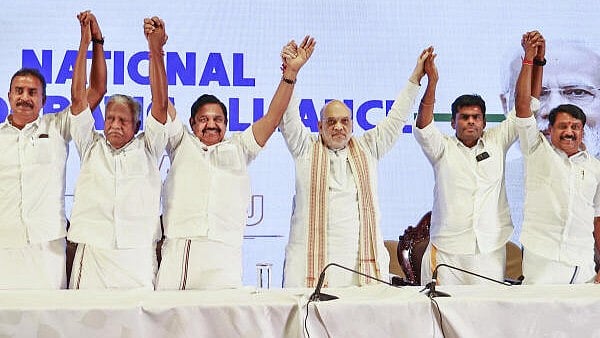
Union Home Minister Amit Shah with AIADMK general secretary Edappadi K Palaniswami, Tamil Nadu BJP President K Annamalai and others during a press conference, in Chennai, Friday, April 11, 2025.
Credit: PTI Photo
On April 11, Union Home Minister Amit Shah claimed that the National Democratic Alliance (NDA) would form a coalition government in Tamil Nadu after the 2026 Assembly polls. Five days later, AIADMK general secretary Edappadi K Palaniswami contradicted him, stating the alliance was merely an electoral understanding—not an arrangement to share power.
In September last year, Viduthalai Chiruthaigal Katchi (VCK), led by Thol Thirumavalavan and a DMK ally, created a stir by sharing an old video of its chief advocating a “share in governance and in power”. This video was soon deleted and reposted.
As the DMK did not endorse the post, the VCK clarified that the clip merely emphasised the party’s long-term vision and should not be interpreted through a political lens. Weeks later, Thirumavalavan said the power-sharing among coalition partners should arise only from political compulsion and not as a precondition for contesting polls together.
Though unrelated and months apart, both developments have a common theme: the aversion of Tamil Nadu’s two Dravidian majors — DMK and AIADMK, who have alternated power in Tamil Nadu since 1967 — to coalition governments in the state.
But, barring the 2016 elections when J Jayalalithaa contested alone, both parties have formed alliances in nearly every Assembly election. They have, however, always contested enough seats to aim for at least a simple majority. These alliances were strictly electoral.
At the heart of their resistance to coalition governments lies a fear of appearing vulnerable and risking the erosion of their core vote bank. The only instance when a coalition government was in 1980, when the Congress and DMK jointly made such a promise--but failed to secure victory.
However, both parties have shared power at the Centre. The DMK enjoyed long stints in various Union Cabinets for about 17 years — 1989-1990, 1996-1998, 1999-2003, and 2004-2013—while the AIADMK joined briefly under Charan Singh in 1979 and A B Vajpayee-led Cabinet in 1998-1999.
Tamil Nadu has also faced unusual situations where alliance partners of the ruling party secured the Leader of Opposition post in the Assembly —in 1984, 1991, 1996, and 2011—due to the sheer number of seats they had won. Often, the rival front fared so poorly that an alliance partner had to step into the role.
DMK, which gave the slogan ‘Autonomy in States and Federalism at the Centre’ in the 1960s, resisted sharing power with its allies in 2006 despite failing to secure the 117 seats needed for a majority in the 234-member Tamil Nadu Assembly, even as J Jayalalithaa delivered the AIADMK’s best performance in a losing election to date.
With just 96 MLAs, M Karunanidhi ran a minority government for its entire five-year tenure, with “outside” support from the Congress, which won 34 seats.
This arrangement was sustained through Karunanidhi’s political shrewdness, his sway over the Congress (whose UPA-I government relied on DMK’s support), and his strong rapport with Sonia Gandhi.
Jayalalithaa, on the other hand, either secured a landslide victory or suffered major defeats, except in 2016 when she won a simple majority. She would dismantle her alliances soon after the polls. As senior journalist R Bhagwan Singh observed, “She never practised political finesse; she spoke her heart.”
With the death of these two political giants—Karunanidhi and Jayalalithaa—Tamil Nadu’s evolving political landscape may eventually compel the AIADMK and DMK to consider coalition governments, especially as new players like Tamilaga Vetri Kazhagam (TVK), led by actor Vijay, have promised to share power with allies.
Singh noted that no party shares power unless absolutely necessary, and such political exigencies have not arisen, except in 2006.
“After being the dominant force, the Dravidian parties don’t want to descend to a lesser status. Sharing power with smaller parties would undermine their political dominance. Moreover, they do not want to lose the label of a strong political party,” he told DH.
Professor Ramu Manivannan, former political science professor at the University of Madras, said the Dravidian parties’ strong vote share explains their resistance to sharing power.
“The ground is still held by Dravidian parties, and coalitions at the national level are different from those at the states. There are not many examples of influential coalition experiments in states,” he added.
He added that no one is preventing smaller parties from working on the ground to increase their vote share, but demanding power-sharing without a significant vote base is unjustifiable.
The BJP, still struggling to gain a foothold in Tamil Nadu, claims the NDA will form the government in the state. Meanwhile, several DMK allies quietly aspire to share power, anticipating a fragmented verdict in future elections.
Prof Manivannan does not rule out such possibilities: “Such a situation (agreeing to a coalition government) may arise. We must wait and see whether parties and people will accept such an arrangement.”
R Kannan, biographer of Dravidian legends C N Annadurai and M G Ramachandran, believes Tamil Nadu will not hesitate to embrace coalition governments, as neither the DMK nor the AIADMK appears capable of securing a clear majority in the coming elections.
However, he says it would not be a prudent decision for the AIADMK to contest elections by promising to form a coalition government, which is why Palaniswami has clarified that the alliance with BJP was only for elections.
“A coalition government after the elections remains a possibility, and in such a scenario, they may need to agree to form one. Over time, I believe Tamil Nadu could resemble Kerala, where electoral alliances consistently lead to coalition governments,” he said.